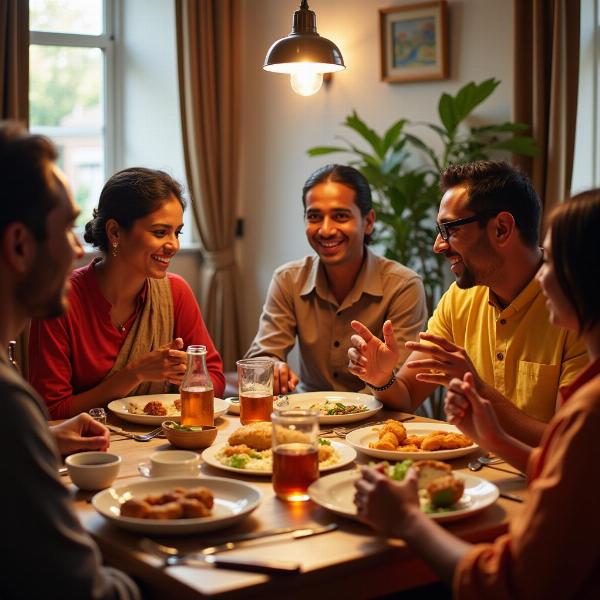Understanding the nuances of expressing oneself after a meal in Hindi can be crucial for navigating social situations and showing respect. “After meals meaning in Hindi” encompasses various phrases and expressions, reflecting the richness of Indian culture and etiquette. This guide will delve into the common ways to say “after meals” in Hindi, exploring their meanings, cultural contexts, and appropriate usage.
Exploring “After Meals” Expressions in Hindi
Several Hindi words and phrases convey the idea of “after meals.” Let’s explore some of the most commonly used ones:
-
भोजन के बाद (bhojan ke baad): This is the most literal translation of “after meals” and is widely understood. It’s a formal and respectful way to refer to the period following a meal.
-
खाना खाने के बाद (khana khane ke baad): Similar to “bhojan ke baad,” this phrase translates to “after eating food.” It’s slightly less formal but still polite.
-
भोजनोपरांत (bhojanoprant): This is a more sophisticated and literary term for “after meals.” It’s often used in formal settings or written texts.
-
पश्चात भोजन (pashchat bhojan): Meaning “after food,” this phrase is less common but adds a touch of elegance.
Cultural Significance of After-Meal Etiquette
In India, meals are not just about sustenance; they are social events that foster bonding and connection. The period after a meal holds cultural significance, often dedicated to conversation, relaxation, and digestion. Respectful behavior and appropriate language are valued during this time.
Expressing Gratitude and Satisfaction
After a meal, expressing gratitude and satisfaction is customary. Phrases like “बहुत स्वादिष्ट था (bahut swadisht tha)” meaning “it was very delicious,” or “धन्यवाद (dhanyavaad)” meaning “thank you,” are common ways to show appreciation to the host.
Avoiding Certain Activities
Certain activities are traditionally avoided immediately after meals. For instance, strenuous physical activity or bathing is discouraged as it’s believed to interfere with digestion.
Common Questions About “After Meals” in Hindi
What’s the most polite way to say “after meals” in Hindi? भोजनोपरांत (bhojanoprant) is considered the most polite and formal term.
What are some customs associated with the after-meal period in India? Conversation, relaxation, and avoiding strenuous activities are common customs.
What to Say After Meals in Different Contexts
Whether you’re at a formal dinner or a casual gathering, knowing the appropriate phrase for “after meals” can enhance your communication. Here are a few examples:
-
Formal: “भोजनोपरांत, मैं थोड़ा आराम करूँगा (Bhojanoprant, main thoda aaram karunga)” – “After the meal, I will rest for a bit.”
-
Informal: “खाना खाने के बाद, चलो बातें करते हैं (Khana khane ke baad, chalo baatein karte hain)” – “After eating, let’s chat.”
 Conversation After a Meal
Conversation After a Meal
Conclusion
Understanding “after meals meaning in Hindi” is more than just knowing the translation; it’s about appreciating the cultural context and nuances of the language. Using the appropriate expressions demonstrates respect and fosters better communication in social situations. Whether you use bhojan ke baad or bhojanoprant, choosing the right phrase can enrich your interactions and deepen your understanding of Indian culture.
FAQ
- What is the simplest way to say “after meals” in Hindi? Khana khane ke baad is a simple and commonly used phrase.
- Is it polite to discuss business immediately after a meal in India? Generally, it’s considered more polite to engage in casual conversation before discussing business matters.
- What is the meaning of pashchat bhojan? It means “after food.”
- Why is rest recommended after meals in Indian culture? It is believed to aid digestion.
- How do I express satisfaction after a meal in Hindi? Bahut swadisht tha (it was very delicious) is a common expression.
- What does bhojanoprant mean? It is a formal term for “after meals.”
- Is it customary to offer thanks after a meal in India? Yes, expressing gratitude is considered polite.
Meaning-Hindi.in specializes in providing accurate and culturally sensitive Hindi translation services, covering a wide range of fields from business and legal documents to website localization and technical manuals. Our expert linguists ensure that your message is conveyed effectively while respecting cultural nuances. For all your Hindi translation needs, contact us at [email protected] or call us at +91 11-4502-7584. Meaning-Hindi.in is your trusted partner for bridging the language gap.